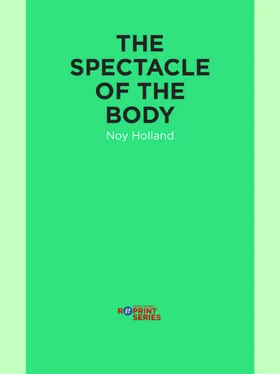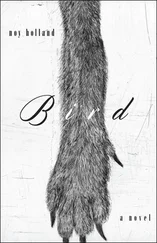There was a parrot on the screened-in porch, poking at the man’s wet shoes. Buenos dias , it sang. Howdy do .
The man said, “I could tell it suchwise, missus — from Coney Island to my house.”
He took a sip from the cup of tea Mrs. Finn had made for him. The parrot climbed into one shoe.
“It was dusk,” the man said, “one wintry, one-color day. Where it was I had come back from, I can no longer recall. I had come in my usual way, expecting, as usual, no one. But there he sat on the steps of my home.”
Palm fronds clashed past the missing screen of the big kitchen window. The smell of bread traveled the rooms.
“George had been out to Coney Island,” the man said, “where Atlantia takes over the land. There he swore the sky had swelled up above him. ‘I lay on my back on the dirty sand and the sky came and laid down along me,’ George swore, ‘heavier than a woman and pleasanter, too, until I thought she would. .’
“Ah,” the man said. “You have your doubts. You have your doubts, I see that.”
Mrs. Finn had pulled to the edge of her easy chair. She was fingering the hole in her apron.
“George assured me you would not, in the beginning, understand. Try to understand,” the man said. “I present it to you as a single tale from Coney Island to my house. But George had been all over. He was a thoughtful man. George thought, Inside me is the Kingdom of Heaven.
“But even heaven scared George then. The bones of the roller coaster sang in the wind. Fish washed onto the dirty sand and rolled back into Atlantia again. Would heaven be like this ? George feared. This rancid, tumorous gray? If this was how, after all, he looked inside, would this be his share of the Kingdom of Heaven?
“He said, ‘Waves breaking easy on the dirty sand made a dim, high-slapping sound, like a great deck of cards being shuffled.’
“George palmed his chest, where the swelling was. ‘How about,’ he joked, ‘a bit more color: cholera green, pneumonia blue, salmonella yellow?’”
Mrs. Finn crossed her legs at the ankles. From the fold of her apron in the space between her legs, both of her hands were lifted, pressed between the man’s two hands like the pages of a book he might read. The man knelt up. How pale his face was. Mrs. Finn felt herself being prayed to, though it made no sense to her why. The man kissed the tips of her fingers.
“Listen, little bird. A small sleep,” he said, “a small slumber, and the memory of him is me.”
The man’s hands slipped so softly from hers that Mrs. Finn’s hands were left praying.
The rain let up; the house grew quiet. A crocodile slid into the pond.
The man sat back on his haunches and, hearing the hard weight of him against the bare wood floor, Mrs. Finn brought her knees together, and she stood, and sure that she was not watching him, instead the man listened, such soft things, those footsteps, going away and gone now and coming back again.
When Mrs. Finn came back into the room, the man was in George’s easy chair, the one chair in the one room the wind had not walked through, picking and choosing from among their things. Mrs. Finn sat down on the floor on the cushion she had brought for the man to sit on. The man poured the last of the tea, though it had gotten cold by then, into a cup, which Mrs. Finn drank from.
“Suppose this,” he began again. “Reckon that when the Beginning began, Our Father exploded. Our Father art tiny trillions of pieces riding above the world.
“His was a strange pilgrimage,” the man said, “your George’s was. He caught the next train to Manhattan. George thought, If I believe in one God, and that God exploded, does it not stand to reason, then, that in the Beginning there was one man — one set of eyes and arms and legs, one heart, one head — and that he, too, exploded?
“Suppose that the world is a single body where each man’s pain is every man’s sorrow, were each man, created in a shattered God’s image, jettisoned into the stratosphere by the force of a huge explosion, came falling upon the earth.
“That makes so many ways of fitting together, and only so many pieces.”
The man leaned toward Mrs. Finn, bending away from the back of the chair, the joints of his hips creaking.
“See my hands,” he said. “Look here.”
Mrs. Finn held his hands in both of her hands. She turned and turned them over. “And these, too,” the man said, leaning ever more, his eyes so close to Mrs. Finn’s eyes that their eyelashes were almost touching.
“These are your husband’s eyes,” he whispered. “I know all about you, duckie. I have been all over.”
Mrs. Finn lighted a candle between them. The last of the sun had gone from the sky and left not the crimson of frequent evenings, but a fat, dank, catholic gray, noticed not by Mrs. Finn nor by Mrs. Finn’s stranger, talking on as he did in small ways a stranger now to outside things, talking against the silence that pressed against their lives.
The stranger lowered himself from the easy chair and sat bent-kneed beside Mrs. Finn on the bare wood floor.
At the edge of the pond, in a halm of reeds, a cat stalked dragonflies, beetles.
Again the man spoke, and again, though he himself seemed not aware of it, a change usurped his voice.
“I have been where George has been, only not so far, not quite so far as George is now, but elsewhere, yes, all over. I have been to Macy’s,” said the stranger, rocking now so fast on his haunches that Mrs. Finn placed her hand on his arm, desperate to calm him.
“I know all that George knows, more and less,” he said. “How things cost you an arm and a leg, catch your eye, spin your head. I know about fathers who say to you, ‘Son, I couldn’t do without you; you know you’re my right-arm man.’
“But, duckie? When George’s father died out, George himself kept walking.”
The man lowered his mouth to Mrs. Finn’s hand, still calm against his arm. With his teeth, he tugged at her wedding ring. With his tongue, he parted her fingers.
“There is a man near Macy’s,” he said, “who sells plastic birds for a dollar. His one sleeve hangs empty. ‘Hey, mister! When you fill ‘em with water, they sing!’
“This got George thinking. His head swam with thoughts. If you lost an arm, was George’s way of thinking, if you had to do without, then was there not some way, if you one day decided you could not keep on doing without, to go ahead and find your man and get your arm right back again? Was your arm, after all, not a body walking, stopping at storefronts, selling things on the corners of streets? Or if not, was it maybe a body still falling, a body you could find in the Kingdom of Heaven, in a place where, finally sorted through, everybody looked like you?
“When your own body betrays you, parts of you keep living with living people’s bodies. For the people who are whole, there are parts of you left. There is a web of the parts of you left that the people you love will know about.
“Do you see why I have come?”
The stranger carried the bird into the kitchen and filled it with water at the kitchen sink. Hens were coming out of the outhouse, white beyond the palm fronds, beyond the missing window screen, just shapes as far as the man could see, not seeing the twist and tilt of their heads as they heard him, him blowing through that bird a cock’s crow; Mrs. Finn heard the man crow, too, her head, too, tipped over, perched again in George’s easy chair, and then the coo that was like the coo of a dove that the parrot on the porch failed to parrot, giving off something more of a caw and, Mercy, Mrs. Finn thought, this with what was now so mercilessly the crinkling of a cane in the kitchen, the parrot failing at this as well, calling out coo instead, the parrot calling coo coo ricoo .
Читать дальше











